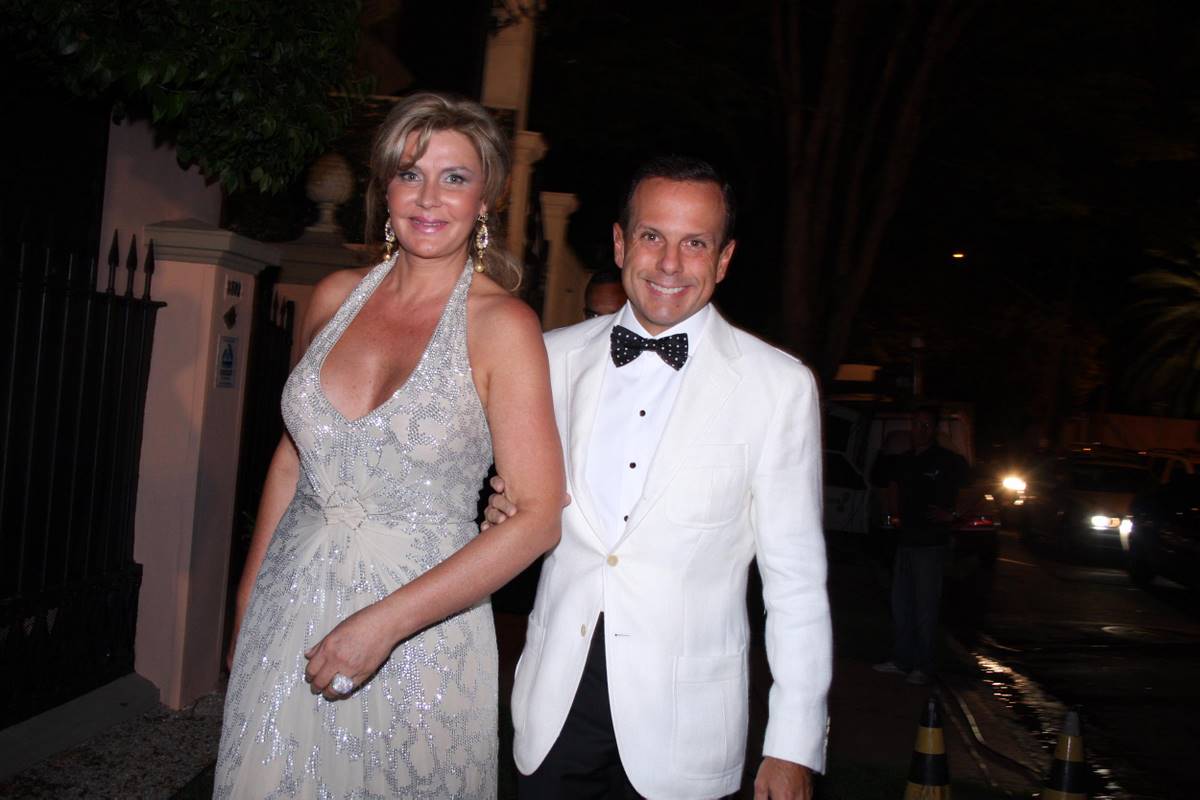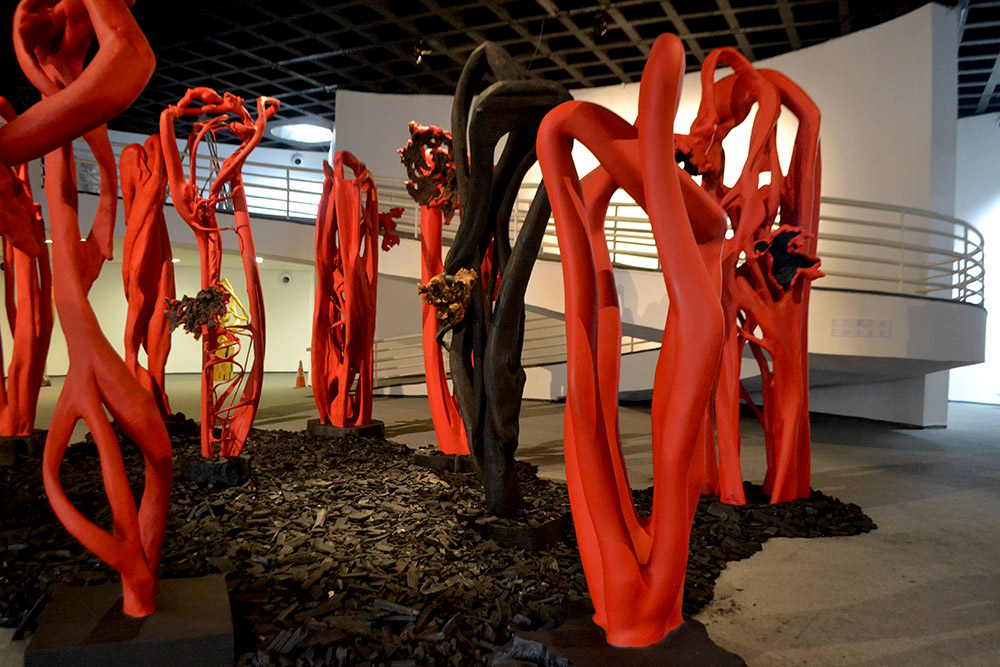Can’t Buy Me Love
by Silas Martí

Bia Doria, wife of the mayor of São Paulo, poses inside one of her sculptures.
He’s a multimillionaire former host of The Apprentice who flaunts a rather obscene nouveau riche lifestyle, the kind of guy who would have a big fat Botero hanging in his living room. Much the same way Americans woke up one day and found they had an orange reality TV star as president, natives of São Paulo were dumbstruck last October by the sweeping victory, in the first round of last year’s mayoral election, of João Doria — who, just like his northern counterpart, concluded each episode of O Aprentiz with the indelible catchphrase Você está demitido (“You’re fired”). Doria, as much a newbie in politics as the man now sitting in the Oval Office, doesn’t have a real estate empire, hotels, golf courses, or a Trump Tower of his own. He runs, among other business ventures, a magazine named Caviar Lifestyle. He lives in a mansion the size of a city block in the richest enclave of South America’s biggest metropolis, now as heavily guarded as Trump’s Fifth Avenue abode. São Paulo’s new mayor also likes designer suits, though his visual signature is a Ralph Lauren sweater draped around his neck, with a snug knot over the chest. (The preppy look has led political commentators here to compare him to the cartoon character Richie Rich.)
Doria, like Trump, banked on a power vacuum, and he won the mayoralty by promising to spout “You’re fired” to an old, tired, corrupt political class caught in the throes of Operation Car Wash — the ongoing police investigation into the largest political scandal in Brazil’s history, which has sunk the reputation of entrepreneurs and parties across the ideological spectrum. Though he lags behind the American president in tantrums and Twitter rants, Doria and his family have made headlines by talking in public the way they do over dinner in South Florida, although, where Trump prefers his Palm Beach resort, the Dorias, like any good Brazilians, prefer Miami. Doria has bragged that he has enough money to live to the end of his days without working, and, with the spontaneity of a wax figure, he promised to donate his first paycheck as mayor to “children with defects,” by which he meant infants with disabilities. Not much later, during a debate, he had a strange Martin Luther King moment, saying he hoped for the day all Brazilians would be able to wear Ralph Lauren sweaters just like him.

But it is his wife, the visual artist Bia Doria, who has so far caused more uproar. Blonde, a former model, Bia has made a career selling corporate lobby-type sculptures carved out of dead trees salvaged from country roadsides. They are, in reality, knock-offs of the work of the Polish-born sculptor Frans Krajcberg, who has been making similar work here for several decades, and whom Bia calls her “master.” In a book penned for her, Bia gives juicy details on how she stalked the famously reclusive Krajcberg all the way to his tree house in the middle of the woods in the south of Bahia, a prowess made possible thanks to her friend’s private jet. Failing to meet him there, the new paulistana first lady then managed to find the artist during a check-up at a São Paulo hospital.
To those who didn’t read her authorized biography, Bia showed off her extreme obliviousness, not only of the city she lives in but of its rich art scene, in an interview she gave me at her palatial studio in the posh district of Vila Nova Conceição. The interview, published in the newspaper Folha de S. Paulo just after the election, quickly went viral — just as we were learning that the city was to be governed by a couple who rarely leaves the wealthy, leafy districts they like to compare to a little pocket of Switzerland right here in the tropics. (In another of Bia’s controversial declarations, by the way, she likened Paraisópolis, one of São Paulo’s biggest favelas, to Ethiopia.) In her own private Zurich, in an expansive property full of carpenters carving away at tree trunks, Bia disclosed that she felt like a modern-day Evita Perón. (Perhaps she’s eyeing a future for João in Brasília; Operation Car Wash has significantly weakened the likely candidates in the next presidential election, and Doria, a rare survivor from the wreckage, is now his party’s strongest contestant for the 2018 race.) She went on to tell me that her assistants, before joining her team, all lived in shacks. She gave them new homes, new teeth and good — private — health care. “They’re happy today,” Bia exulted. “They even feel like they’re artists, because they work for me.”

She told me she detests contemporary art, and she likes only painting and sculpture, which she calls “art art.” She hated the last Bienal de São Paulo, one of the most prestigious art events in the world. She complained that Brazil’s public collections were too weak, and cited Miami as the kind of art world hub the city should strive to emulate. Under her husband’s administration the Centro Cultural São Paulo, the city’s most important Kunsthalle, named a jewelry designer as chief curator. She didn’t last more than two months on the job; the position remains vacant.

But the Dorias, despite Bia’s tree trunks, couldn’t be further away from the arts. Once in office, the new mayor made a point to erase a number of world-famous murals that cover some of the main traffic arteries of the city, part of an effort labeled Cidade Linda (Beautiful City). After his crusade against street art met with public outrage, Doria explained that he wanted to model São Paulo’s rich graffiti scene after Miami’s Wynwood Walls, which concentrates murals under a private umbrella, and in a restricted part of town. João and Bia were up in Miami a few months ago, to visit their longtime friend and favorite artist Romero Britto: a kitsch illustrator who has rendered the entire Doria clan in his gaudy, colorful style. Five hang in the Doria mansion. A new one, depicting an aerial view of this newer, flashier São Paulo under Doria’s rule, was bequeathed to the mayor’s cabinet office, the perfect image of a city now run on steroidal marketing and shocking tastelessness.